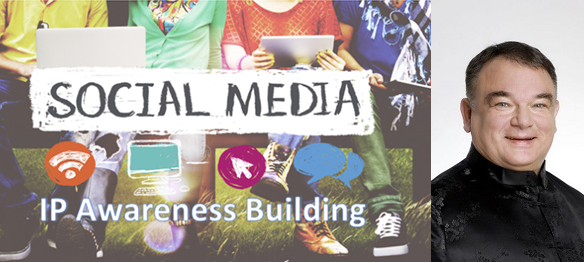Online Marketing for IP Experts – Interview with Martin Schweiger
To create awareness about the online marketing best practice for IP experts we are regularly interviewing IP experts, who are successfully using LinkedIn and other digital channels to position themselves and gain new clients via those channels. Additionally, we are showing their best practice in the online marketing Newsletter of the 🎯 IP Management Pulse and its Online Marketing Guides. Here you can find the last issues in the archive and also subscribe to never miss any of our online marketing resources. Summary of the key answers by Martin Schweiger:
- IP experts are becoming more specialized and need to show it
- Online marketing works via Google and good content
- To grow you need to embrace online marketing
Background Question 1:
We are currently seeing a continuously accelerating digital transformation in the IP system. Especially in dealing with the stakeholders of the IP system as well as in the relationship and communication between attorneys and clients. As well as networking and professional exchange between IP experts, for example via social networks such as LinkedIn.
IP business academy: How do you perceive these changes?
Martin Schweiger: That question is deep. I gave a talk on this topic exactly 5 years ago on May 17, 2018, to the New York City Chapter of the International Intellectual Property Society (IIPS). The talk was titled “Algorithm Lawyers – How & How Soon?”.
Everything I predicted has come true. More law firms are now fully in the cloud, and the traditional law firm business has changed a lot.
Law firms are more involved in their clients’ businesses and decision-making.
There are more freelancers in the IP business, and more clients are working directly with them, bypassing traditional law firms that cannot adapt to the cloud.
Clients are outsourcing more tasks to specialized IP services providers, like annuities/renewal fee payments, prior art searches, and freedom-to-operate (FTO) searches.
In the past, it was desirable to have a one-stop-shop law firm for everything. Today, the IP world is more specialized. Solo IP lawyers work in specific technical areas and outsource clerical work to larger firms. Clients accept this and use specialized IP management software to ensure nothing is missed.
… as well as networking and professional exchange between IP experts, for example via social networks such as LinkedIn?
That has changed a lot compared to the last century. It used to be normal to spend dozens of hours on an article and submit it to one of the few publishers in the IP world. Today, it is common to quickly share news on LinkedIn, which is now the favorite social media platform for IP professionals. Others can take that information from LinkedIn, turn it into a larger article, and share it with a wider audience on LinkedIn. This cycle continues.
Background Question 2:
Expert marketing refers to the targeted presentation and positioning of experts and their expertise. This includes a strong personal brand presence of the expert in the online area, in particular the creation and distribution of high-quality and useful content, and targeted lead generation. This also includes online reputation management, i.e. monitoring and positively influencing your own expert brand.
How important is your expert positioning for you and your business?
I cannot quantify my personal brand presence online. It may be good or bad. I have 15,000 LinkedIn contacts and 5,000 Facebook contacts, and I post content regularly.
I also cannot measure the impact of my online presence on our business. We have received a few orders mentioning LinkedIn content, but most of our orders come from targeted email campaigns.
When I meet peers at events, they talk more about my weightlifting successes than my IP activities, even though I post more about IP.
The most tangible return on investment (ROI) from online activities comes from Google Adwords. I do not believe in LinkedIn InMail campaigns yet, and I would like to know more about targeted LinkedIn ads, Facebook, TikTok, and Instagram.
Background Question 3:
50% of all decision-makers in business today are millennials and therefore digital natives. These are people who are used to obtaining information digitally and shopping digitally. The search behavior for specialist information has changed fundamentally in recent years. 40% of the 3.5 billion searches per day on Google are shifting to social networks and so more and more content is presented there. More and more customer journeys in the legal sector are taking place completely online.
How important do you consider online marketing to be?
Online marketing is the only practical way to scale a business. Attending trade fairs has a negative ROI and high opportunity costs due to travel. Additionally, there is a risk of quarantine due to concerns about virus transmission.
… and how important is a consistent customer journey for potential clients from social media to the website to email?
that is a rhetorical question, correct? We all want to achieve that.
Background Question 4:
The search behaviour for experts and the initiation of personal contacts has also changed due to social distancing during Corona pandemic and the current “new normal work“. The Google searchability of experts and their reputation is increasingly determined by their online presence. Spending on online marketing increased by 31 % last year. Designed for professional, professional relationships, LinkedIn is growing by 15% annually with over 830 million members and is by far the most important network for legal advisors and IP experts.
Do you also observe these growth rates in client requests from your Online Marketing?
Yes.
About the interviewee:
 Martin “AI-Assisted Patent Drafting” Schweiger is a European Patent and Trademark Attorney and Innovation expert. He is also Host of “The 4×4 Innovation Meet” online radio and book author of “The 4×4 Innovation Strategy”.
Martin “AI-Assisted Patent Drafting” Schweiger is a European Patent and Trademark Attorney and Innovation expert. He is also Host of “The 4×4 Innovation Meet” online radio and book author of “The 4×4 Innovation Strategy”.



